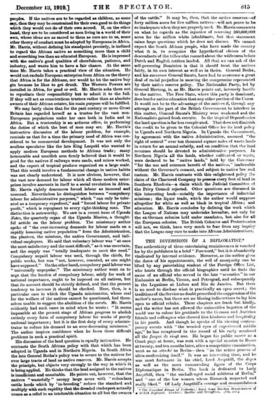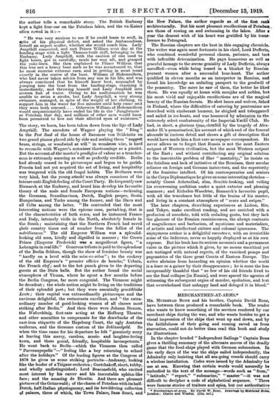THE DIVERSIONS of A DIPLOMATIST.*
THE authenticity of these entertaining reminiscences is vouched for by the publishers in a brief " Foreword," but it is abundantly vindicated by internal evidence. Moreover, as the author gives the dates of his appointments, the veil of anonymity can be lifted by any painstaking student of the Foreign Office List, who hunts through the official biographies until ho finds the name of an official who served in the late "seventies" in our Embassies at Berlin, Vienna, and Petrograd, and subsequently in the Legations at Lisbon and Rio de Janeiro. But theta is no need to disclose what is practically an open secret ; the traditions of the Service no doubt prescribed the suppression of the author's name, but there are no blazing indiscretions to lay him open to official rebuke. These chapters aro frank but kindly. and the writer has not allowed the animosities begotten of the world war to colour his gratitude to the German and Austrian friends and colleagues who showed him kindness and hospitality in his youth. And though he speaks of his viewing contemporary events with " the wearied eyes of experienced middle age," he has recaptured in the record of his early manhood all the fougae de eingt ans. He began his public career as a Court page at home, was sent with a special mission to Route at twenty, and ten months later, after a competitive examination, went. as an trifschd to Berlin—then " in the active process of ultra-modernizing itself." It was an interesting time, and he was most fortunate in his chief, Lord Ampthill, the dois a as well as the most commanding figure of the Corps Diplornatique in Berlin. The book is dedicated to Lady Ampthill, then the unchallenged social arbitress of Berlin," and " one of the few women whom Bismarck respected and really liked." Of Lady Ampthill's courage and resourcefulness
the author tells a remarkable story. Tho British. Embassy kept a light four-oar on the Potsdam lakes, and the ex-Kaiser often rowed in it
He was very anxious to see if he could learn to scull, in spite of his physical defect, and asked the Ambassadress, herself an expert sculler, whether she would coach him. Lady Ampthill consented, and met Prince William next day at the landing-stage with a light Thames-built skiff, belonging to the Embassy. Lady Ampthill, with the caution of one used to light boats, got in carefully, made her way aft, and grasped the yoke-lines. She then explained to Prince 'William that this was not a heavy boat such as ho was accustomed to, that he must exercise extreme care, and in getting in must tread exactly in the centre of the boat. William of Hohenzollern, who had never taken advice from any one in his life, and was always convinced that he himself knew best, responded by jumping into the boat from the landing-stage, capsizing it immediately, and throwing himself and Lady Ampthill into sixteen feet of water. Owing to his malformation he was unable to swim a stroke, but Lady Ampthill, a very strong swimmer, managed, in spite of the weight of her clothing, to support him in the water for five minutes until help came and they were both rescued.... Otherwise William of Hohenzollern would unquestionably have ended his life in the Jungfernsee at Potsdam that day, and millions of other men would have been permitted to live out their allotted span of existence."
The story, we learn, has been taken down from the lip of Lady Ampthill. The anecdote of Wagner playing the " Ring "
in the Feet Seal of the house of Baroness von Schleinitz on two grand pianos placed side by side and making them " suggest brass, strings, or woodwind at will " in wondrotte wise, is hard to reconcile with Wagner's notorious'ehortcoming,s as a pianist. But the aceceme.of the-master's prodigies of valour as a trencher man is• extremely amusing as well as perfectly credible. Berlin had already ceased to be picturesque and begun to be garish. Prussia had not yet acquired the art of living, and hospitality was tempered with the old frugal habits. The Berliners were very kind, but the young attache was always conscious of the intense anti-English feeling of the Court• Party. He frequently saw Bismarck at the Embassy, and heard him develop his favourite
theory of the male and female European nations—reckoning the Germans, Scandinavians, Dutch, English proper, Scots, Hungarians, and Turks among the former, and the Slays and all Celts among the latter. " He contended that the most interesting nations were the epicene ones, partaking, that is
of the characteristics of both sexes, and he instanced France and Italy, intensely virile in the North, absolutely female in the South ; maintaining that the Northern French had saved their country times out of number from the follies of the meridionaux." The old Emperor William was a splendidlooking old man, kindly and dignified in manner ; the Crown Prince (Emperor Frederick) was a magnificent figure, " a
Lohengrin in real life." Generous tribute is paid to the splendour of the Berlin Schloss, though the show of feminine beauty was
" hardly on a level with the mise-en-seene" ; to the cookery of the old Emperor's " premier officier de bouche," Urbain, the French chef; and to the hot punch given to the departing
guests at the State balls. But the author found the social atmosphere of Vienna, where he spent a few months before
the Berlin Congress, far more congenial. The Viennese might be decadent ; the whole nation might be living on the traditions of their splendid past; but they were essentially gemiithliche Leute ; their capital was extraordinarily picturesque and the
environs delightful, the restaurants excellent, and " the extraordinary number of good-looking women of all classes most
striking after Berlin." And then there were Johann Strauss, the Wa/zerrconig, first-rate acting at the Hofburg Theatre, and other amenities to compensate for the drawbacks of the cast-iron etiquette of the Hapsburg Court, the ugly Austrian uniforms, and the tiresome custom of the Schliieselgeld. So when the time came for his departure he felt " genuinely sorry at leaving this merry, careless, musicand laughter-loving
town, and these genial, friendly, hospitable incompetents." He went back to Berlin—which the Viennese then called " Parvenupopolis "—" feeling like a boy returning to school after the holidays." Of the leading figures at the Congress of 1878 he gives us some striking portraits—Andrassy, looking like the leader of a Tzigane orchestra ; Gortchakoff, short, tubby, and wholly undistinguished; Lord Beaconsfield, who excited most interest by his career and his inscrutable sphinx-like fate; and the amazing de Blowitz; And there are pleasant pictures of the GrUnewald ; of the charm of Potsdam with its halfDutch, half-Italian physiognomy, and its bewildering collection of palaces, three of which, the Town Palace, Sans Semi, and the New Palace, the author regards as . of the first rani architecturally. But his most pleasant recollections of Potsdam , are those of rowing on and swimming in the lakes. After a year the dearest wish of his heart was gratified by his trans ference to Petrograd. .
The Russian chapters are the best in this engaging chronicle. The writer was again most fortunate in his chief, Lord Dufferin, who combined wonderful personal charm, patience, and tact with inflexible determination. He pays humorous as well as graceful homage to the serene geniality of Lady Dufferin, always unruffled--even while being tossed in a blanket by Russian peasant women after a successful bear-hunt. The author qualified in eleven months as an interpreter in Russian, and found his knowledge an unfailing passport to the, goodwill of the peasantry. The more he saw of them, the better he liked them. He was equally at-home with moujiks and nobles, but his most vivid and enjoyable recollections are of the magical beauty of the Russian forests. He shot bears and wolves, fished in Finland, where the difficulties of catering by pantomime are described with exuberant humour, he sleighed and tobogganed and sailed in ice-boats, and was 'honoured by admission teethe extremely select confraternity of the Imperial-Yacht Club. He had, in short, a glorious tinge, clouded by the tragedy of Alexander IL's assassination-, iris account of which and of the funeral abounds' in curiousdetail and shows a gift of description that would have made him a first-rate newspaper correspondent. He never allows us to forget that Russia is not the most Eastern outpost of Western civilization, but the most Vestern outpost of the East ; and without contributing any original solution to the inscrutable problem of Slav "mentality," he insists on the fatalism and lack of initiative of the Russians, their secular reliance on foreign and German instructors, and the superiority of the feminine intellect. Of his contemporaries and seniors in the Corps Diplomatique he gives us some interesting sketches— notably Count Aehrenthal, slim, Semitic-looking, and veiling his overweening ambition under a quiet exterior and pleasing manners ; and Kiderlen-Waechter, Bismarck's favourite pupil, with all the truculence but little of the brains of his master, and living in a constant atmosphere of " scars and swipes."
The later chapters, describing experiences at Lisbon, Rio, and Tokyo, make excellent reading, and are enriched with a profusion of anecdote, told with unfailing gusto, but they lack the glamour of the Russian reminiscences, the abrupt contrasts of magnificence and barbarism, of mysticism and materialism, of artistic and intellectual culture and colossal ignorance. The anonymous author is a delightful raconteur, with an irresistible sense of the ludicrous, never so happily displayed as at his own expense. But his book has its serious moments and a permanent value in the picture which it gives, by no means uncritical yet not untinged with natural regrets, of the vanished pomps and pageantries of the three great Courts of Eastern Europe. The writer abstains from hazarding an opinion whether the world is a loser or a gainer by their disappearance ; he is none the less inexpressibly thankful that " so few of his old friends lived to see the final collapse [in Russia], and were spared the agonies of witnessing the subsequent orgies of murder, spoliation, and lust that overwhelmed that unhappy land and deluged it in blood."



















































 Previous page
Previous page